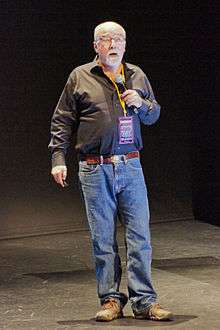James C. Coyne

James C. Coyne (born 22 October 1947) is an American psychologist.
Education
Coyne received his B.A. (1968) from Carnegie-Mellon University and his Ph.D. in Psychology (1975) from Indiana University (dissertation title Depression and the Response of Others[1]). After being a Clinical Psychology Intern at the University of Florida in 1972-3, he was an instructor at Miami University from 1973 to 1975, where he became an Assistant Professor in 1975. He became professor at the Perelman School of Medicine at the University of Pennsylvania in 1999 and became emeritus professor in 2013.[2]
Research
A 2007 study led by Coyne found that positive emotional well-being was not associated with increased life expectancy among head and neck cancer patients.[3][4][5]
Views
Coyne has criticized the field of positive psychology and the research claiming that a positive attitude can impact one's health.[6][7] He has also criticized studies which have concluded that personality traits are linked to an increased risk of cancer death.[8]
Coyne has stated that a 1970s study by Ellen Langer, which found that elderly people given plants to take care of lived longer than those who were not, would not have "much credibility today, nor would it meet the tightened standards of rigor."[9]
In 2015, Coyne attacked Gabriele Oettingen's book Rethinking Positive Thinking and accused Oettingen of aggressively promoting pseudoscience while ignoring other research in clinical psychology.[10][11] Coyne pointed out that as part of Oettingen's aggressive promotional campaign for her book, her own son created Wikipedia articles about her work.[11]
In 2017, Coyne attacked his co-editors at the Journal of Health Psychology, calling one a "disgusting old fart neoliberal hypocrite" and telling another to "f*** off. Let's get all this backchannel bullshit into the open, you ol' sleazebag".[12] The disagreements were over the special issue on the PACE trial for chronic fatigue syndrome, which three of his co-editors considered to be too one-sided.[12]
References
- ↑ Coyne, James C. (1975). Depression and the Response of Others. Indiana University. Available from ProQuest Dissertations & Theses Global. (302763599).
- ↑ "The 2014 Newly-Retired Faculty". University of Pennsylvania Almanac. 6 May 2014.
- ↑ Coyne, James C.; Pajak, Thomas F.; Harris, Jonathan; Konski, Andre; Movsas, Benjamin; Ang, Kian; Watkins Bruner, Deborah (1 December 2007). "Emotional well-being does not predict survival in head and neck cancer patients". Cancer. 110 (11): 2568–2575. doi:10.1002/cncr.23080.
- ↑ Gellene, Denise (5 November 2007). "Mood doesn't help in cancer survival". Los Angeles Times. Retrieved 13 February 2015.
- ↑ Barone, Jennifer (February 2008). "Hope May Be Useless Against Cancer". Discover. Retrieved 13 February 2015.
- ↑ Azar, Beth (April 2011). "Positive psychology advances, with growing pains". Monitor on Psychology. Retrieved 13 February 2015.
- ↑ Marchant, Jo (10 July 2014). "Can meditation really slow aging?". CNN. Retrieved 20 April 2015.
- ↑ Norton, Amy (13 August 2010). "Personality not linked to cancer risk or prognosis". Reuters. Retrieved 13 February 2015.
- ↑ Grierson, Bruce (26 October 2014). "What if Age Is Nothing but a Mind-Set?". New York Times. Retrieved 13 February 2015.
- ↑ Coyne, James C (16 September 2015). "Do positive fantasies prevent dieters from losing weight?". plos.org. PLOS. Archived from the original on 2 October 2015. Retrieved 7 November 2015.
- 1 2 Coyne, James C (23 September 2015). "Promoting a positive psychology self-help book with a Wikipedia entry". plos.org. PLOS. Archived from the original on 8 October 2015. Retrieved 7 November 2015.
- 1 2 "The Times: Scientists trade insults over myalgic encephalomyelitis (ME) study". meassociation.org.uk. ME Association. 1 August 2017. Retrieved 27 October 2017.